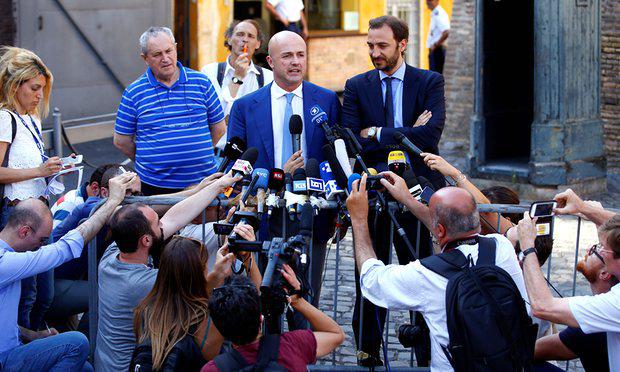|
Vatileaks journalists cleared as PR consultant and priest found guilty
By Rosie Scammell
A Vatican court has convicted a priest and a PR executive over their roles in leaking secret documents to two journalists, ending a trial during which scandal and intrigue returned to haunt the seat of the Roman Catholic church. Eight months after the Vatican launched its case against five defendants caught up in the “Vatileaks II” scandal, only one – the Spanish monsignor Angel Lucio Vallejo Balda – will be heading for a jail cell in the city state. Announcing their verdict on Thursday, judges ordered the priest to serve 18 months in prison for leaking confidential documents to the reporters Emiliano Fittipaldi and Gianluigi Nuzzi, who wrote books exposing the inner workings of the Vatican. Francesca Chaouqui, an Italian public relations consultant, was given a 10-month suspended sentence, and the court ruled it did not have jurisdiction over Fittipaldi and Nuzzi, who received the leaked documents on Italian rather than Vatican soil, and therefore could not convict them. The fifth defendant, Nicola Maio, who worked as Balda’s assistant, was acquitted. The sentences, which came after a lengthy trial dominated by accusations of mafia ties, threats and romance, not to mention serious concerns over the Vatican’s commitment to press freedom, were more lenient than those requested by prosecutors, who had called for Chaouqui and Balda to serve more than three years each in jail. Before the trial, Fittipaldi and Nuzzi said they risked sentences of up to eight years, based on the Vatican’s strict anti-leaks law, a possibility that alarmed media groups. The books by Nuzzi, Merchants in the Temple, and Fittipaldi, Avarice, alleged widespread financial mismanagement and waste at the heart of the Catholic church. The journalists exposed the workings of a Vatican commission set up in 2013 to advise Pope Francis on reforming the Vatican bureaucracy. Balda was an obvious choice for the papal commission because of his work at the Vatican’s prefecture for economic affairs, although the inclusion of Chaouqui, a laywoman, raised some eyebrows. The pope has since described their appointments as a mistake. Fittipaldi said he had spent years working on his investigation before receiving a limited number of documents from Balda, whereas closer ties were established between Balda and Nuzzi. The books revealed strong resistance among the Vatican hierarchy to Francis’s transparency drive, and detailed lavish spending and a lack of accountability. In March, Balda admitted having passed information to journalists but suggested he had been coerced into it. While the trial may serve as a warning to other insiders considering speaking to journalists, it shone a greater spotlight on the secretive Vatican, and the two books became bestsellers. The Vatican’s chief spokesman, Fr Federico Lombardi, rejected suggestions that the trial had been an over-reaction. “It needed to be done, to demonstrate the will to fight with determination the manifestations and the mistaken consequences of internal Vatican tensions and controversies,” he said. Indiscretion and leaking documents to the media had negative consequences on public opinion, Lombardi said in a statement, arguing that people had a right to “objective and clear information”. The work of Fittipaldi and Nuzzi is regarded has having already had a positive impact on Vatican policy. They exposed a lack of accounting in the sainthood process, which could cost hundreds of thousands of pounds a time. In March, the pope tightened controls on the path to canonisation, ordering more stringent bookkeeping and greater supervision during staff investigations into whether a person qualifies for saint status. The court case against the journalists began to fall apart when Balda admitted he had not been directly threatened by the two journalists. But during the trial he said he feared repercussions from Chaouqui, who he believed had powerful connections in Italy. Chaouqui dismissed the Spanish priest’s claims that she was a high-ranking secret service agent or could appeal to the mafia for support. One of her lawyers, Laura Sgro, told the court this week that Chaouqui should not be convicted just because she was “unlikeable, unpleasant, insufferable, arrogant and presumptuous”. The Italian was pregnant during the trial and recently gave birth to a son, Pietro, whom she vowed to take to jail with her if convicted and given a custodial sentence. Balda has been in custody since November, although he has recently been allowed out on day release. He will have three days to appeal against the verdict, although he could put his hopes in a papal pardon. The priest’s conviction came four years after the first Vatileaks scandal, in which Nuzzi published the private correspondence of Pope Benedict XVI. The pope’s butler, Paolo Gabriele, was jailed in October 2012 after he admitted having handed over the secret documents. Gabriele claimed he acted out of love for the Catholic church and the pope, who pardoned him after two months in prison. Lombardi said on Thursday it would be up to Francis to decide whether or not to pardon Balda and Chaouqui.
|
.
Any original material on these pages is copyright © BishopAccountability.org 2004. Reproduce freely with attribution.
